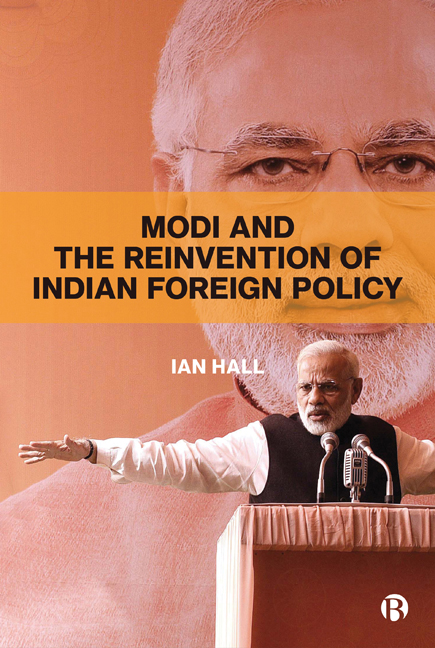Book contents
- Frontmatter
- Contents
- Abbreviations
- Glossary
- Notes on the Author
- Acknowledgements
- Preface
- 1 Introduction
- 2 Nonalignment to Multialignment
- 3 Hindu Nationalism and Foreign Policy
- 4 Modi and Moditva
- 5 World Guru India
- 6 Prosperity and Connectivity
- 7 National Power and Regional Security
- 8 Conclusion
- Notes
- References
- Index
- Frontmatter
- Contents
- Abbreviations
- Glossary
- Notes on the Author
- Acknowledgements
- Preface
- 1 Introduction
- 2 Nonalignment to Multialignment
- 3 Hindu Nationalism and Foreign Policy
- 4 Modi and Moditva
- 5 World Guru India
- 6 Prosperity and Connectivity
- 7 National Power and Regional Security
- 8 Conclusion
- Notes
- References
- Index
Summary
From the beginning, independent India was ‘the subject of a particular, very deliberate act of invention’ (Corbridge and Harriss, 2000, p. xvii). Its political system, constitution, economic system and society were selfconsciously moulded by a postcolonial political elite. India's inventors were the leaders of the Indian National Congress (INC), a mostly uppercaste, well-educated, English-speaking group that had struggled for independence for more than a generation and that inherited government after the British relinquished control of the country on 15 August 1947. Despite the haste in which power was transferred, the widespread violence that accompanied Partition, and the enormity of the governing such a large, complex, overwhelmingly poor country, this group seized with alacrity their extraordinary opportunity to imagine and craft a new Indian state, and with it, Indian society. They were not, of course, wholly united in their ‘ideas of India’, but with energy and purpose they set about the task of constructing a new state, putting in place institutions and processes to manage their disagreements, and reforming society. Within five years, they had determined that India should have a democratic political system, that federalism was the best means of managing its diversity, that the state should not privilege one religion over another, and that government ought to play a major role in modernising its economy and society. They agreed an ambitious constitution, held a general election, launched a Five- Year Plan to develop the economy, and engaged in a remarkable bout of diplomatic activism in support of decolonisation, disarmament and the peaceful resolution of disputes.
This postcolonial, ideological ‘invention of India’ (Tharoor, 2003), led by the Congress Party, and the country's first Prime Minister, Jawaharlal Nehru, did not of course please all. Already dismayed by the Partition of India, Hindu nationalists in particular criticised the Nehru government's commitments to secularism and socialism, and its desire to modernise India following Western models. They wanted an India that advanced the interests and values of the Hindu majority and that was governed in ways more closely aligned with what they perceived as authentically Indian thought and practice.
- Type
- Chapter
- Information
- Modi and the Reinvention of Indian Foreign Policy , pp. xi - xivPublisher: Bristol University PressPrint publication year: 2019



